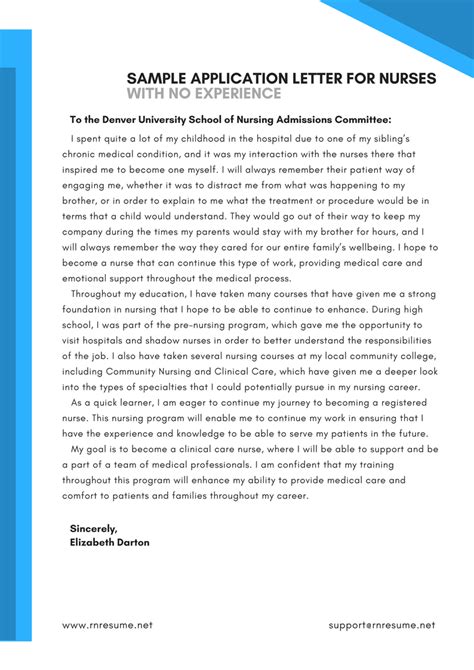Writing a compelling application letter as a nurse without experience can be a daunting task. However, with the right approach, you can increase your chances of standing out from the competition and landing an interview. In this article, we will provide you with five tips to help you craft a strong application letter as a new nurse.
Tip 1: Tailor Your Letter to the Job

When applying for a nursing position, it's essential to tailor your application letter to the specific job you're applying for. This means carefully reading the job description and requirements, and highlighting your relevant skills and experiences. Even if you don't have direct nursing experience, you may have skills or experiences that are transferable, such as communication skills, teamwork experience, or volunteer work. Make sure to emphasize these skills and show how they can be applied to the nursing role.
Example of a Tailored Application Letter
"As a new nurse, I am excited to apply for the Registered Nurse position at [Hospital Name]. With a strong foundation in nursing principles and a passion for delivering high-quality patient care, I am confident that I can make a valuable contribution to your team. In my previous role as a [previous role], I developed strong communication skills, which I believe will enable me to effectively communicate with patients, families, and healthcare teams."
Tip 2: Highlight Your Education and Training

As a new nurse, your education and training are your greatest assets. Make sure to highlight your degree, certifications, and any relevant coursework or training programs you've completed. This will demonstrate to the employer that you have a solid foundation in nursing principles and practices.
Example of Highlighting Education and Training
"I recently graduated from [Nursing Program] with a Bachelor of Science in Nursing degree. Throughout my program, I gained a solid foundation in nursing principles, including anatomy, physiology, pharmacology, and nursing skills. I also completed a clinical rotation in [clinical rotation], which provided me with hands-on experience in a fast-paced healthcare environment."
Tip 3: Showcase Your Skills and Abilities

Even if you don't have direct nursing experience, you may have skills or abilities that are relevant to the nursing role. Make sure to showcase these skills and abilities in your application letter. For example, if you have experience working with technology, highlight your proficiency in electronic medical records or other healthcare software.
Example of Showcasing Skills and Abilities
"In addition to my nursing education and training, I possess excellent communication and interpersonal skills, which I believe are essential for delivering high-quality patient care. I am also proficient in [electronic medical records system], which I believe will enable me to efficiently and effectively manage patient information."
Tip 4: Demonstrate Your Passion for Nursing

Employers want to hire nurses who are passionate about their profession and committed to delivering high-quality patient care. Make sure to demonstrate your passion for nursing in your application letter. Share your reasons for becoming a nurse, and highlight any experiences or accomplishments that have reinforced your passion for the profession.
Example of Demonstrating Passion for Nursing
"I have always been drawn to the nursing profession because of my desire to make a positive impact on people's lives. Throughout my nursing program, I had the opportunity to work with patients and families from diverse backgrounds, which deepened my understanding of the importance of culturally sensitive care. I am excited to bring my passion for nursing to [Hospital Name] and contribute to the delivery of high-quality patient care."
Tip 5: Proofread and Edit Your Letter

Finally, make sure to proofread and edit your application letter carefully. A well-written letter with no errors will make a stronger impression on the employer than a letter with mistakes. Ask a friend or mentor to review your letter and provide feedback before submitting it.
Example of a Well-Written Application Letter
"Dear [Hiring Manager],
I am excited to apply for the Registered Nurse position at [Hospital Name]. With a strong foundation in nursing principles and a passion for delivering high-quality patient care, I am confident that I can make a valuable contribution to your team.
As a new nurse, I am eager to bring my skills and knowledge to a dynamic and patient-centered healthcare environment. I am impressed by [Hospital Name]'s commitment to [aspect of hospital's mission or values that resonates with you], and I am excited about the opportunity to be part of a team that shares my values.
Thank you for considering my application. I would welcome the opportunity to discuss my qualifications further and explain in greater detail why I am the ideal candidate for this role.
Sincerely, [Your Name]"





We hope these tips and examples have helped you to craft a strong application letter as a new nurse. Remember to tailor your letter to the job, highlight your education and training, showcase your skills and abilities, demonstrate your passion for nursing, and proofread and edit your letter carefully. Good luck with your job search!
What is the most important thing to include in a nursing application letter?
+The most important thing to include in a nursing application letter is a clear and concise statement of your qualifications and experiences. This should include your education, training, and any relevant skills or certifications.
How should I structure my nursing application letter?
+Your nursing application letter should be structured in a clear and logical manner, with an introduction, body, and conclusion. The introduction should include a brief overview of your qualifications and experiences, while the body should provide more detailed information about your skills and abilities. The conclusion should summarize your main points and express your enthusiasm for the position.
What are some common mistakes to avoid in a nursing application letter?
+Some common mistakes to avoid in a nursing application letter include typos and grammatical errors, lack of clarity and concision, and failure to tailor the letter to the specific job and employer.
